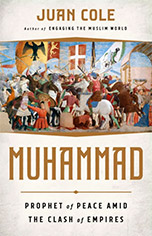One of the early chapters of the Qur’an is “The City,” chapter 90 in the standard version. It gives us a good idea of the verses being recited by the Prophet Muhammad around 613, three years into his ministry, once he started preaching publicly.
I discuss this period in Chapter 3 of my new book:

Muhammad: Prophet of Peace amid the Clash of Empires, coming out October 9
Available for pre-order at Barnes and Noble
And Nicola’s Books in Ann Arbor
And Hachette
And Amazon
The chapter is about vices and virtues. Muhammad’s early followers are contrasted with a wealthy and powerful notable of Mecca in western Arabia. He takes pride in how much money he has wasted, and thinks he is invincible. He likely worships the pantheon of the North Arabian pagan religion. The Qur’an warns that he will be consigned to hellfire if he goes on like that.
In contrast, the Believers in Muhammad’s mission believe in freeing slaves, feeding the desperately poor, and caring for orphans. In short, they believe in doing charity and helping the helpless.
The Qur’an sums up these virtues as patience and compassion.
It resembles what Jesus said in Matthew 25:35-36, 40:
- for I was hungry and you gave me food, I was thirsty and you gave me something to drink, I was a stranger and you welcomed me, I was naked and you gave me clothing, I was sick and you took care of me, I was in prison and you visited me. . . Truly I tell you, just as you did it to one of the least of these who are members of my family, you did it to me.
The list of the disadvantaged in the two passages differs in particulars, but the basic idea is the same. Muhammad’s command to manumit slaves, by the way, inspired even American 19th century abolitionists like Lydia Maria Child.
Peace theorist Johan Galtung of Oslo suggested that there are two kinds of peace. Negative peace is the mere absence of conflict and war. Positive peace is achieved when people take measures to ensure the peace. I think the Qur’an is saying that compassion for the poor is a form of positive peace that reduces social conflict and hatred. Arrogance, haughtiness, cold-heartedness and being a spendthrift, in contrast, lead to strife.
Compassion for the less fortunate is therefore a key element of Muhammad’s teaching. Some of the opposition he received likely came from the supercilious wealthy who resented his preaching of the duty to care for the poor.
Here is my rendering of this chapter:
The City (Qur’an 90:1-20)
In the Name of God, the Merciful, the Compassionate
I swear by this city–
and you have legitimacy in this city—
and by parents and their offspring!
We created human beings for hardship.
Does he think that no one will ever overcome him?
He says, “I have squandered an enormous amount of wealth!”
Does he think that no one has seen him?
Did we not make for him two eyes,
and a tongue, and two lips?
Did we not guide him to the two pathways?
But he never attempted the steep path.
And how would I make you understand the steep path?
It is freeing a slave
or feeding, during a famine,
an orphan related to you,
or a grubby vagrant.
Then he would be one of the believers who counseled patience and compassion.
They are the companions of the right hand.
But those who reject our verses are companions of the left hand.
They will be trapped by walls of fire.



 © 2026 All Rights Reserved
© 2026 All Rights Reserved